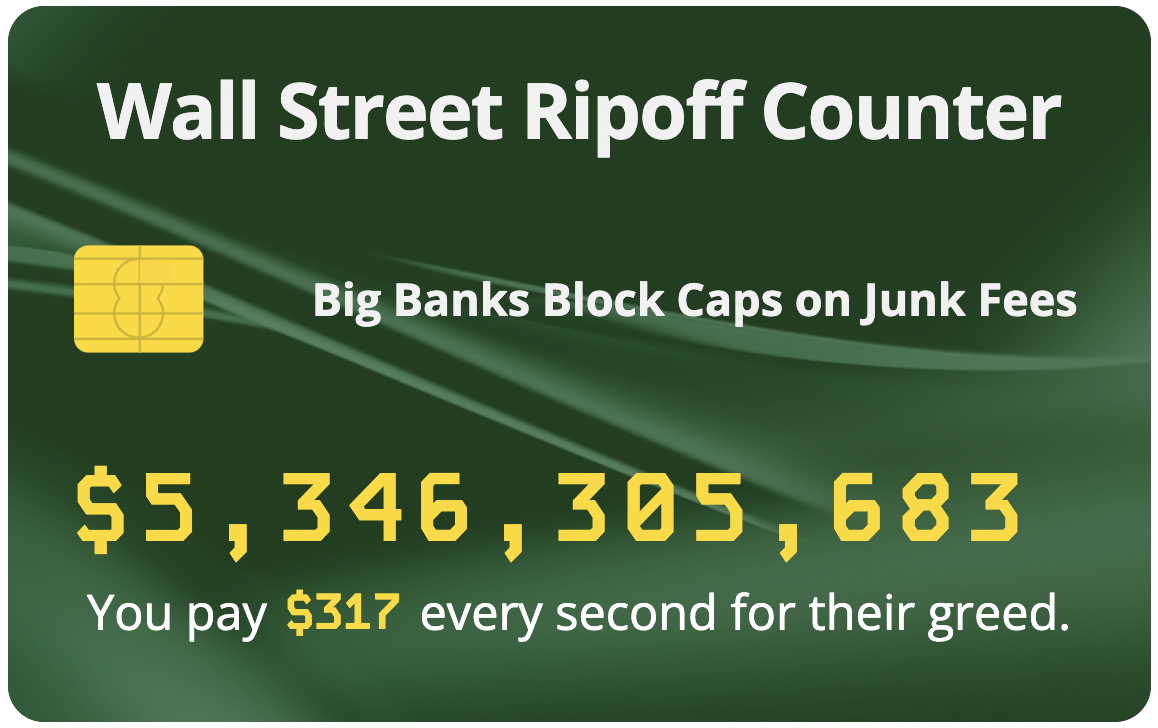FOR IMMEDIATE RELEASE:
Nov. 26, 2024
CONTACT
Carter Dougherty, carter@ourfinancialsecurity.org
Live Counter Tallies Cost to Consumers as Big Banks Block Credit Card Late Fee Cap
WASHINGTON, D.C. – A cap on junk fees could have saved consumers billions. Now, opposition from big Wall Street banks is costing consumers $317 each and every second.
Today, Americans for Financial Reform is launching the Wall Street Ripoff Counter that tallies the money consumers have lost since big banks managed to block a new consumer protection limiting credit card late fees in court. With the holiday season coming up, consumers will be spending more on gifts and other items they purchase with credit cards thanks to the greed of Wall Street banks that rake in billions in profit from late fees each year.

“Big banks must not be allowed to stop this new cap on junk fees, a power play that does nothing but boost their profits at the expense of everyone but especially hard-working families living paycheck-to-paycheck and consumers of color, who pay a disproportionate share of the fees,” said Amanda Jackson, consumer campaign director at Americans for Financial Reform. “Consumers should not have to pad the bottom lines of the banks that issue their credit cards and charge outrageous fees, which will make holidays more expensive in 2024 than they need to be.”
By the time of the popular Black Friday shopping day, banks will have taken over $5.25 billion from their credit card customers.
Background:
In March 2024, the Consumer Financial Protection Bureau banned excessive late fees on credit card bills, bringing down the average late fee to cardholders from $32 to $8. The move, which closed a longstanding loophole in bank regulations that had allowed banks to inflate the fees far beyond what late payments cost the banks, would have saved people $10 billion each year.
But big Wall Street banks and the U.S. Chamber of Commerce filed a lawsuit with the most right-wing regional court in the United States, the Fifth Circuit, covering Texas, Louisiana, and Oklahoma. Known for many pro-industry rulings, it is a favorable forum that banks have used to circumvent regulation. And the Fifth Circuit obliged them.
Since May 14 – the date that the Fifth Circuit stopped the cap from taking effect – the counter has tallied up how much $317 per second has cost families:
- $19,020 per minute
- $114,120 per hour
- $2.7 million per day
- $19.2 million per week
- $76.7 million per month
Credit card late fees are part of a set of charges, colloquially known as junk fees, which cost consumers and small businesses tens of billions annually across many industries. Junk fees inhibit competition because their opaque nature makes it hard for consumers to comparison-shop. Fighting them is immensely popular, according to many opinion surveys.
The CFPB, created in the aftermath of the 2008 financial and housing crisis, has the job of protecting consumers in the financial services marketplace. Through its work enforcing the nation’s laws on fairness in finance, the CFPB has won over $20.7 billion in relief for consumers in the form of monetary compensation, principal reductions, and canceled debts.
The big Wall Street banks that the CFPB is trying to regulate are making money on credit cards hand over fist. In addition to the outlandish fees they charge (overdraft fees are particularly outrageous), banks have also set interest rate margins at an all-time high. According to the Federal Reserve, credit cards are some of the most profitable products banks offer, and credit card balances are overwhelmingly held by the largest banks.
“The big banks are, quite simply, raking in billions of dollars in unfair fees, and the federal courts are helping them do it,” said Kimberly Fountain, consumer financial justice field manager at AFR. “What is costing consumers $317 per second? An alliance between Wall Street banks and right-wing judges.”
###

